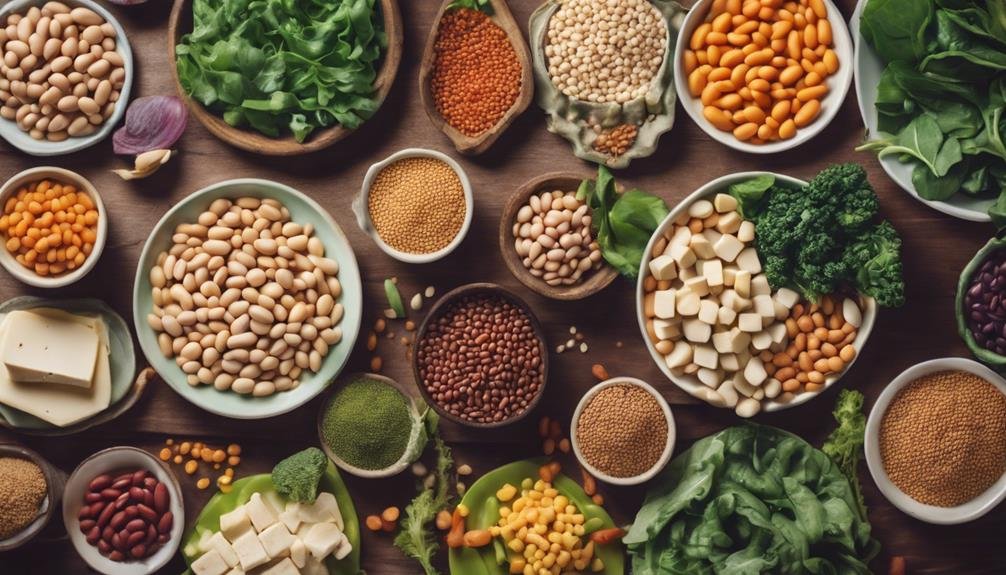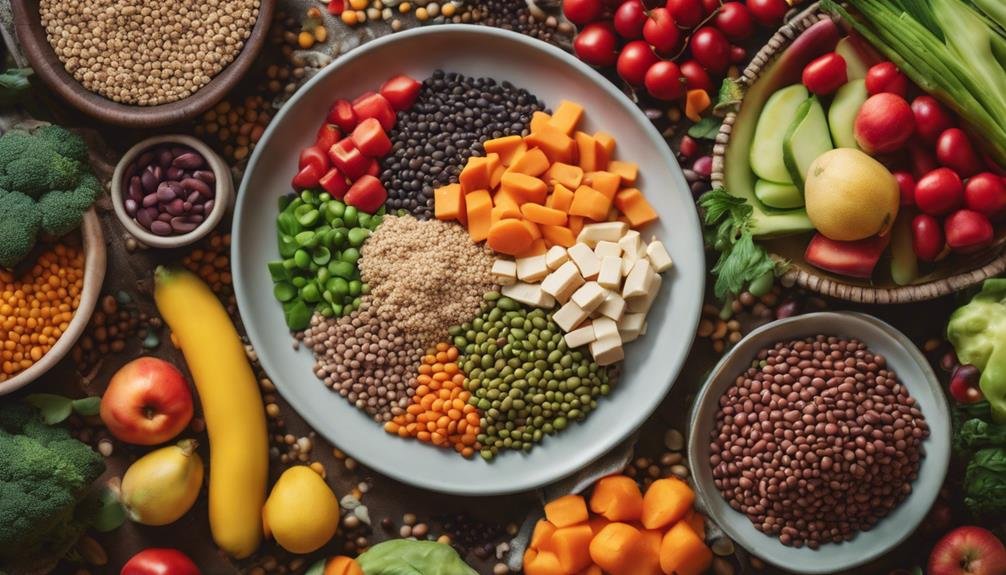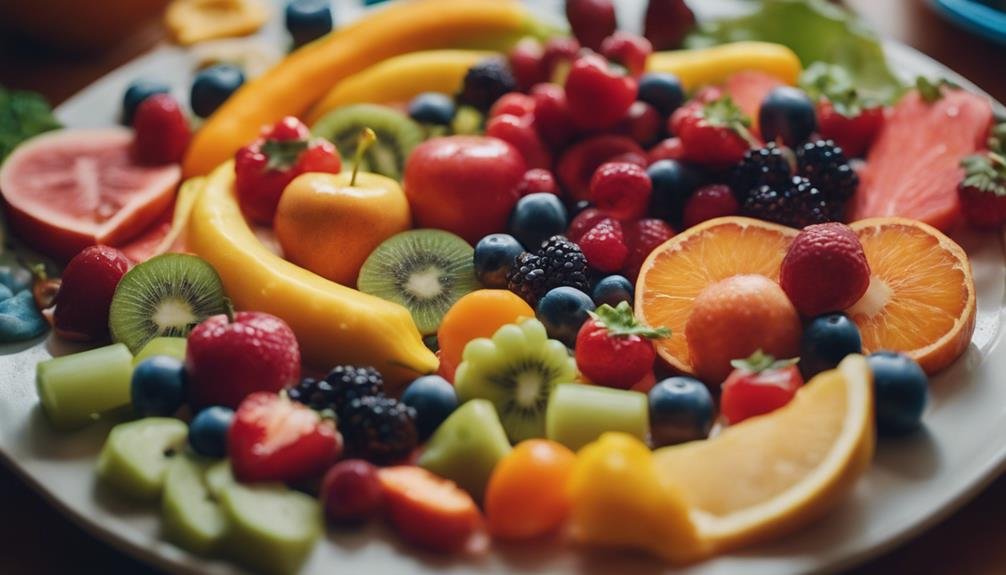"Cherishing Little Steps - A Haven for Baby and Family Journeys"
Vegetarian and Vegan Diets for Toddlers: A How-To Guide for Parents
As a parent navigating the world of vegetarian or vegan diets for your toddler, ensuring they receive adequate nutrition is paramount. But how can you be certain that your child is getting all the essential nutrients they need for healthy growth and development? By understanding the key components of a well-rounded plant-based diet and incorporating strategic food choices, you can set your toddler up for success. Stay tuned to learn practical tips and expert advice on how to navigate the nuances of vegetarian and vegan diets for toddlers.
Key Takeaways
- Ensure balanced meals with diverse plant-based foods for essential nutrients.
- Incorporate iron-rich foods like lentils and beans, paired with vitamin C sources.
- Provide fortified foods or supplements for vitamin B12, calcium, and omega-3 needs.
- Introduce plant-based proteins such as tofu, tempeh, nuts, and seeds.
- Address picky eating by involving children in meal prep and making food fun.
Nutritional Needs of Toddler Vegetarians

To ensure optimal growth and development, toddler vegetarians must pay close attention to meeting their specific nutritional needs through a well-planned diet. One crucial consideration is iron intake. Plant-based sources of iron, such as lentils, beans, fortified cereals, and tofu, can be included in your child's meals to meet their iron requirements. Pairing these foods with vitamin C-rich options like citrus fruits or bell peppers can enhance iron absorption.
Another essential nutrient for toddler vegetarians is vitamin B12. Since this vitamin is primarily found in animal products, fortified foods like plant-based milk or cereals can help fulfill this need. Additionally, omega-3 fatty acids, crucial for brain development, can be sourced from flaxseeds, chia seeds, and walnuts.
Calcium, vital for bone health, can be obtained from fortified plant-based milk and dairy alternatives. Ensuring an adequate intake of protein from sources like legumes, nuts, seeds, and whole grains is also important for your toddler's overall growth. By carefully planning meals that include these nutrient-dense options, you can support your toddler's vegetarian diet effectively.
Building Balanced Meals
Achieving balanced meals is essential for meeting the nutritional needs of toddler vegetarians and supporting their growth and development effectively. To ensure your child gets all the necessary nutrients, aim to include a variety of foods in each meal. Start by offering a mix of fruits, vegetables, whole grains, and plant-based proteins like beans or tofu.
When planning meals, think in terms of colors and textures. A plate filled with a rainbow of fruits and vegetables not only looks appealing but also provides a range of vitamins and minerals. Incorporating different textures, such as crunchy raw veggies or creamy mashed sweet potatoes, can make mealtimes more enjoyable for your toddler.
Don't forget healthy fats like avocados, nuts, and seeds, which are crucial for brain development. Including sources of calcium, such as fortified plant-based milk or leafy greens, is also important for bone health. By offering a variety of foods, you can ensure your toddler receives the essential nutrients needed for their overall well-being.
Introducing Plant-Based Proteins

Introducing a variety of plant-based proteins into your toddler's diet is crucial for ensuring they receive essential nutrients for growth and development. Legumes such as chickpeas, lentils, and beans are great sources of protein, fiber, iron, and zinc. Tofu and tempeh are also excellent options that can be included in various dishes. Nuts and seeds like almonds, chia seeds, and pumpkin seeds provide healthy fats and protein. Quinoa, a complete protein, is a versatile grain that can be mixed with veggies or served as a side dish.
To make it easier for your toddler to enjoy plant-based proteins, consider incorporating them into familiar meals like adding lentils to pasta sauce or blending tofu into smoothies. Snacks like hummus with whole grain crackers or nut butter on whole grain toast can also boost their protein intake. By offering a range of plant-based protein sources, you can help ensure your toddler meets their nutritional needs while following a vegetarian or vegan diet.
Addressing Potential Deficiencies
After incorporating a variety of plant-based proteins into your toddler's diet, it's important to address potential deficiencies that may arise from a vegetarian or vegan eating pattern.
- Vitamin B12: Since this vitamin is mainly found in animal products, consider fortified foods or a supplement to ensure your toddler gets an adequate intake.
- Iron: Plant-based sources of iron are less readily absorbed by the body. Pairing them with vitamin C-rich foods can enhance absorption.
- Calcium: Include fortified plant-based milk alternatives, tofu, leafy greens, and fortified cereals to meet your toddler's calcium needs.
- Omega-3 Fatty Acids: Flaxseeds, chia seeds, hemp seeds, and walnuts are good sources of ALA, a type of omega-3. Consider algae-based supplements for DHA and EPA.
Monitoring your toddler's nutrient intake through blood tests and consulting a healthcare provider or dietitian can help tailor their diet to prevent deficiencies. Remember, a well-planned vegetarian or vegan diet can provide all the necessary nutrients for your toddler's healthy growth and development.
Tips for Picky Eaters

To encourage toddlers with picky eating habits, offer a variety of nutritious foods in creative ways to make mealtime enjoyable and engaging. Try presenting vegetables in fun shapes, colors, or sizes to make them more appealing. You can involve your child in meal preparation, such as letting them choose a vegetable for dinner or helping mix ingredients. Encourage tasting new foods without pressure, as it may take multiple tries before a child accepts a new item. Keep in mind that children's taste preferences can change over time, so reintroducing previously rejected foods later on is a good idea.
Another tip is to pair new foods with familiar favorites. For example, serve a new vegetable alongside a preferred protein source or grain. This can help reduce resistance to trying something new. Additionally, be a role model by enjoying a variety of foods yourself. Children often mimic their parents' eating habits, so demonstrating a positive attitude towards different foods can influence their choices. Remember, patience and persistence are key when dealing with picky eaters. By offering nutritious options in creative ways and maintaining a positive mealtime environment, you can help your toddler develop a healthy relationship with food.
Frequently Asked Questions
Can Toddlers Get Enough Iron on a Vegetarian Diet?
You can ensure your toddler gets enough iron on a vegetarian diet by including sources like beans, lentils, fortified cereals, and dark leafy greens. Pair iron-rich foods with vitamin C sources for better absorption. Consult a pediatrician for guidance.
How Can Parents Ensure Their Toddler Gets Enough Calcium?
To ensure your toddler gets enough calcium, offer fortified plant-based milk, tofu, leafy greens, and fortified cereals. Serve calcium-rich snacks like almonds or chia seeds. Consult a pediatrician for guidance on meeting your child's calcium needs.
Are There Any Specific Vitamins Toddlers on Vegan Diets Need?
Wondering if toddlers on vegan diets need specific vitamins? Absolutely. Vitamin B12 is crucial for their development. Consider fortified foods or supplements. Consult a healthcare provider to ensure your child's nutritional needs are met.
What Are Some Creative Ways to Incorporate Veggies Into Meals?
Get sneaky with veggies by blending them into smoothies, sauces, or muffins. Try fun shapes or colorful arrangements to make veggies more appealing. Involve your toddler in meal prep to increase their interest in eating vegetables.
How Can Parents Handle Social Situations With Non-Vegetarian Food?
In social situations with non-vegetarian food, you can politely communicate your child's dietary preferences in advance. Bringing a dish to share ensures there's something your toddler can eat. Remember, it's okay for your child to choose not to eat certain foods.
Conclusion
In conclusion, ensuring your vegetarian or vegan toddler receives proper nutrition is essential for their growth and development.
Did you know that plant-based diets have been shown to lower the risk of chronic diseases such as heart disease and diabetes in children?
By focusing on balanced meals, incorporating plant-based proteins, and addressing potential deficiencies, you can support your child's health and well-being on a vegetarian or vegan diet.
Stay informed, stay creative, and enjoy the journey of raising a healthy vegetarian or vegan toddler.


